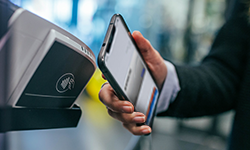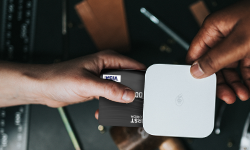NOTICE: The CardValet app has been replaced with My Cards. My Cards can be found when you log into Members First Internet Banking or our mobile app, eliminating the need for additional apps and platforms.

Cash transfer apps such as Venmo and Cash App have become increasingly popular in recent years. Most people have used one of these apps to send or receive money because of the convenience factor. While cash transfer apps are convenient and easy-to-use, these apps also carry risks. Here's what you need to know about how cash transfer apps work and the limitations they present.
How Cash Transfer Apps Work
The primary function of Cash App, Venmo, and other similar apps is to pay people and get paid in the simplest way possible. Cash transfer apps only work once you have linked them to your bank account or a debit card that's linked to your bank account. Once someone pays you through one of these apps, the money "sits" in your app account until you transfer it to your bank. Once initiated, the transfer typically takes anywhere between 1 to 3 days.
Although it takes up to 3 days for the money to show up in the receiving account, the money is immediately withdrawn from the sender's balance in the app or directly from their bank account. There's no way to pause or stop the process once it's initiated. That means once you initiate a payment to someone else using the app, you can't get the money back unless the person on the receiving end voluntarily sends it back to you.
Benefits of Cash Transfer Apps
There are several benefits to using cash transfer apps, which is why they are so popular. These benefits include the following:
- No monthly fees for the most popular cash transfer apps
- No fees to receive or send money (if you're willing to wait a little longer to receive it)
- Ability to make transactions with any funds sitting in your cash transfer app
Disadvantages of Cash Transfer Apps
While there are plenty of benefits associated with cash transfer apps, there are also some disadvantages. The most obvious one is the inability to get your money back once you initiate a transfer. Remember, a cash transfer app functions just like cash. Once you pay someone, you can't cancel the transaction or get your money returned to you (unless the recipient chooses to return it).
What You Should Know About Disputing Cash Transfers
If you're wondering how to dispute cash transfer app charges, the bad news is you can't. Once you initiate a cash transfer, the money is no longer yours. Any attempt to dispute cash transfer transactions after the fact will be unsuccessful, and your financial institution can't do anything to get the money back for you. Many people are unaware of this, despite accepting the warnings, terms and conditions of such apps before using them. Before sending money to anyone using a cash transfer app, make sure you trust the recipient.
Unfortunately, even in cases when someone fraudulently takes your money through Venmo or Cash App and never delivers the promised product, there is nothing your credit union or bank can do to reclaim the money. You have basically handed your cash to the fraudster, and the only way to get it back is by convincing the fraudster to return it. This is a highly unlikely outcome.
How to Minimize Your Risk When Using Cash Transfer Apps
Rules for Safe Cash Transfer App Use:
- Only use a cash transfer app if:
- You know the person
- Or, you have physical possession of the promised product and can confirm it is not fake
- Avoid making any transfers via public Wi-Fi
- Double check the recipient's phone number and/or email address when sending money. If you enter the incorrect information, your money will be routed to someone else, and you have no recourse.
- Don't fall for popular scams online:
- Tickets to sporting events or concerts
- Puppy selling scams
- Fraudulent romantic relationships that involve cash transfers
- Adjust your privacy settings to keep your transactions private (fraudsters can learn about you by analyzing your public purchases on Venmo)
- Never use cash transfer apps for business transactions
- Lock your phone and app with a fingerprint ID, a PIN, and/or two-factor authentication whenever possible
If you're wondering how to use cash apps safely, the answer is simple: only use when you're paying trusted friends and family members. For all other transactions, rely on more secure methods of payment, like a credit card or debit card. Keep in mind, there is no payment method that is invulnerable to risk. That's why we recommend registering your debit card on CardValet — an app that adds an extra layer of security to your card.
Always be vigilant, protect your financial information, and make sure any transaction you make with someone you don't personally know carries a low risk of fraud.
RESOURCES
« Return to "Blog"







